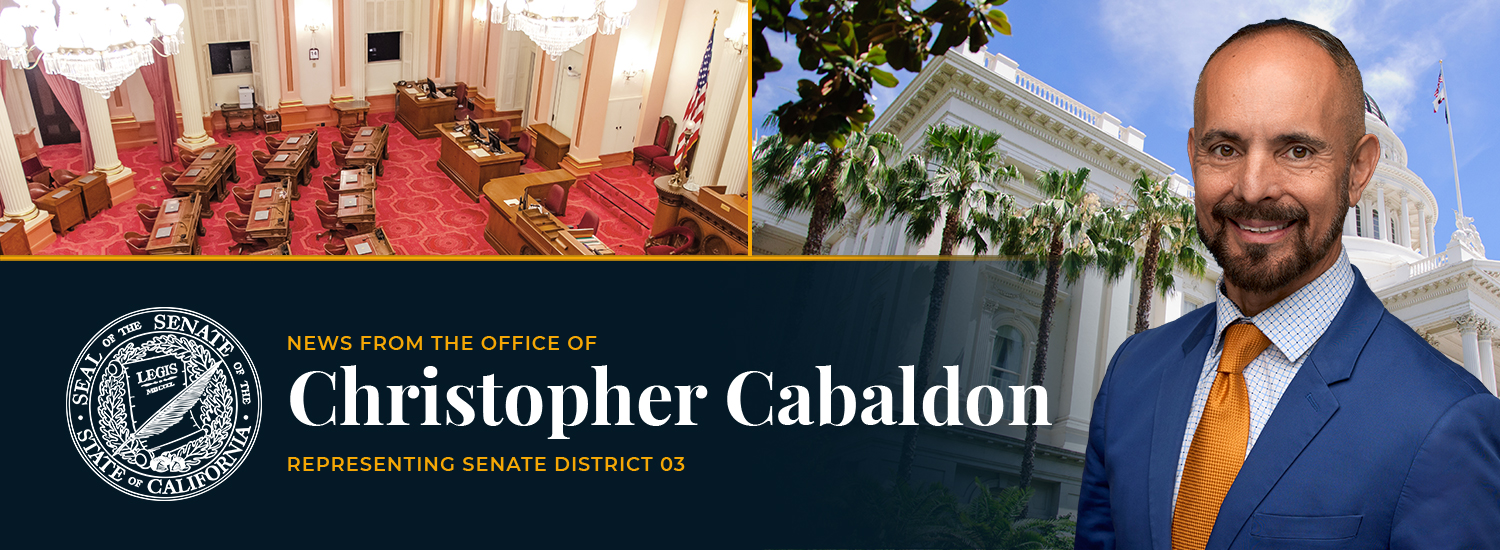
Legislature blocks governor’s attempt to fast-track Delta tunnel; Sen. Cabaldon says it’s time to move on
SACRAMENTO -- Senator Christopher Cabaldon, D-Yolo, and other legislators representing the Sacramento-San Joaquin Delta have successfully rebuffed – at least for now – efforts to speed up the process of building a giant tunnel that would divert water from the Sacramento River before it reaches the Delta and send it to southern California.
The 2025-26 budget package passed by the Legislature and signed by Governor Newsom this week does not include the governor’s proposed legislation to waive regulations to fast-track the so-called Delta Conveyance Project, and to authorize the issuance of bonds to build it despite a court ruling that the bond plan exceeded the state’s authority.
In May, Gov. Newsom proposed such legislation as part of his budget package. The Delta Caucus of lawmakers successfully fought back with the support of leaders in the Senate and Assembly.
The tunnel is fiercely opposed by Delta residents, business leaders, environmentalists and farmers.
"Thankfully our advocacy worked, and this budget does not include any language that would brush aside legal requirements to advance the tunnel and destroy the Sacramento-San Joaquin Delta," Sen. Cabaldon said. "We've told the governor, 'If you want to propose this, you’re going to have to come through the Legislature's policy committees in the full light of day."
The Delta Conveyance Project, as it’s officially known, is the latest version of a plan that was overwhelmingly rejected by voters statewide in 1982 – when it was the Peripheral Canal rather than a tunnel. Governors Arnold Schwarzenegger and Jerry Brown resurrected the idea with a set of twin tunnels, which was scaled back to one tunnel by Gov. Newsom.
This single tunnel would be 45 miles long and 36 feet wide, and capable of carrying 6,000 cubic feet of water from the Sacramento River every second. Currently, the official cost estimate to build it is $20 billion, a figure that has not been updated since 2023 and is expected to rise. Construction is expected to last more than a decade.
Every legislator representing the Delta opposes the tunnel project.
Russell van Loben Sels, whose family has farmed in the Delta since 1876, said construction of two intake diversion points north and south of the tiny town of Hood would destroy farmland and disrupt the ability of farms and businesses in the area to operate by bringing heavy construction traffic to winding, narrow roads. Funneling freshwater around the Delta will exacerbate water quality problems and increase salinity, particularly during dry years, he said.
van Loben Sels said the state’s singular, decades-long focus on building the conveyance project has caused it to neglect lower-cost, common-sense solutions to safeguard the water supply for 27 million people south of the Delta against the more extreme swings in precipitation caused by climate change – including strengthening levees and increasing water storage to capture flows in wet years.
The tunnel plan even undercuts investments the state is already making in more sustainable projects in the Delta and elsewhere in the state. For example, the intakes for the new tunnel would sit in the same area where the state has already spent $370 million from Proposition 1 for Sacramento Sewer to build the biggest recycled water project in the state, the Harvest Water Project, which is already under construction.
Sacramento Sewer is trying to protect the Harvest Water Project through a lawsuit challenging the tunnel. By reshaping the environment, destroying habitat and potentially depleting the groundwater table, Sac Sewer argues, the Delta Conveyance Project would make it much harder for Sac Sewer to achieve the environmental benefits it promised to qualify for the Proposition 1 funding.
“I think the state has been wedded to the plan of taking water around the Delta for 60 years, and they have never been told to go a different route,” van Lobel Sels said. “It’s been around so long it has become some peoples’ career and they would like to keep it moving forward so everyone stays busy. But it’s a terrible project. It was terrible in the 1970s, terrible in 2000 and it’s still terrible.”
van Loben Sels noted that farming districts in central and southern California have backed away from supporting the project because it would cost too much to make sense. At this point, the primary backer of the tunnel is the Metropolitan Water District in southern California.
Yet Metropolitan is seeing demand for water drop as people use less. As a result, it is raising rates 17 percent in the next two years to cover the cost of maintaining its current system.
“These are the same customers whose water bills and property taxes would increase to pay for a tunnel,” Sen. Cabaldon said.
